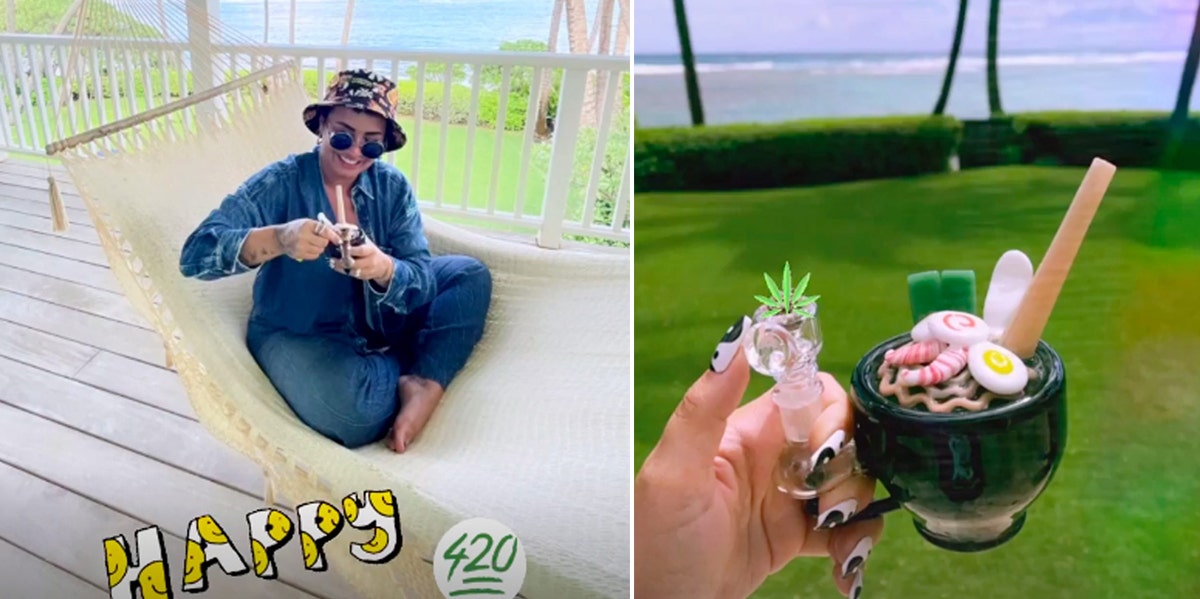Demi Lovato Declares Herself 'California Sober' — But Are Weed And Alcohol Safe For Addicts?
Her recovery technique isn't new, but it is controversial.
 Demi Lovato Instagram
Demi Lovato Instagram Demi Lovato, like so many others, celebrated 4/20 this week, sharing photos of her smoking from a very cute ramen-themed bong on her Instagram Stories.
But Lovato's marijuana-laden festivities raised a few eyebrows given her history of drug abuse, especially her near-fatal 2018 overdose.
With blue skies and seas behind her — and a lot of green before her — Lovato looked happy as she proclaimed to be "California Sober," both a song from her latest album, "Dancing With the Devil... The Art of Starting Over" and the term she is using to describe her current level of sobriety.
What does "California sober" mean?
According to Lovato, California Sober means she's "done with the stuff that's going to kill me."
More specifically, according to Urban Dictionary, California Sober is a form of sobriety which "excludes all uses of illicit drugs, prescription drugs, illegal drugs, and Alcohol, and utilizing only Marijuana in Moderation."
In ;an episode of her YouTube documentary series that accompanied her album release, Lovato explains her Califotnia sobriety in more detail.
"Telling myself that I can never have a drink or smoke marijuana, I feel like that's setting myself up for failure because I am such a black and white thinker," she says. "I had it drilled into my head for so many years that one drink was equivalent to a crack pipe."
"I'm California sober / It doesn't have to mean the growin' part is over," Lovato sings in the lyrics of her new song. "No, it ain't black or white, it's all of the colors / That I only just discovered, now I'm California sober."
According to counselor Audrey Tait, however, there's another term that describes the recovery technique Lovato is using: harm reduction.
What is harm reduction?
Much addiction treatment involves complete abstinence and detox.
Harm reduction, on the other hand, involves a variety of treatments including the potential for practicing moderation with certain substances.
"Harm reduction is when a person realizes the harm that they have caused personally to themselves or others," Tait says. "They make a decision to stop or reduce the use of drugs and/or alcohol that cause harm. Now, they choose to use the substance in a healthy manner, perhaps in a social setting with boundaries."
Does harm reduction work?
The short answer is, that's up to the individual.
According to a 2014 study of over 9,000 individuals with addiction, those who chose to abstain over moderation had a higher quality of life and were able to more effectively maintain sobriety in the long run, but people who were able to practice moderation were younger like Lovato.
Time will tell
What do Lovato's friends think of her version of California sober?
This decision is a source of fear and controversy for friends of Lovato, as well as other loved ones of those who've struggled with addiction and choose some form of harm reduction or her version of California sobriety.
Lovato's friend and former assistant, Jordan Jackson, admitted in the docuseries, "It does kind of scare me now to know that she isn't sober."
A fellow superstar who's shared his struggles with addiction, Elton John, appeared on camera to echo Jackson's concerns, saying, "Sorry. If you drink, you're going to drink more. If you take a pill, you're going to take another one. You either do it or you don't."
For those who wish to try engaging in moderation as a form of harm reduction, Tait, offers hope.
"For some, it may not be safe to engage in addictive behaviors. For others, they can learn to control their choices," she says. "They may need to see someone who is specialized in addiction counseling. Definitely, a person should know their boundaries around use and know when they need to stop."
According to Tait, moderate alcohol consumption for men is two beers or equivalent per day, and for women one beer or the equivalent per day.
What should you tell friends who are against your choice to be California sober?
Tait offers a few helpful phrases to give friends who express concern:
"I know my boundaries and choose to stick to them."
"I am working with a therapist regarding my issues."
"This is one way to deal with the problem."
For help and information about addiction, including recommended treatment programs, please call 1-877-SAMHSA-7 (1-877-726-4727) or visit their website.
Courtney Enlow is Editor of Pop Culture and Good News at YourTango. Her work has appeared at Vanity Fair, Glamour, Pajiba, SYFY FANGRRLS, Bustle, Huffington Post, io9, and others. She is the former co-host of the podcasts Trends Like These and Strong Female Characters.
